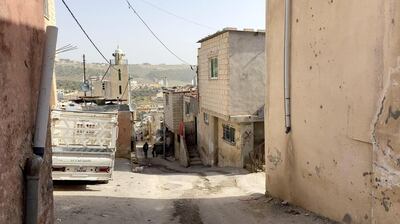It was raining heavily in Jerash, northern Jordan – the first rain of the winter to hit the nearby Palestinian refugee camp.
While most residents remained indoors, the elders braved the weather, emerging from their homes to convene at the camp's social centre.
“Today, we are here to talk about Palestine," says a smiling Miriam Abu Sitta to a small group of young boys listening attentively.
“So they remember their country,” she explains.
camp volunteer
Now in her eighties, Miriam was one of the very first Palestinian refugees to arrive in Jerash camp from Gaza in 1967, following the Arab-Israeli war. More than 50 years later, she remains stateless.
Although a large portion of Jordan’s 10 million Palestinian refugees and their descendants have citizenship and the right to government services, this is not the case for refugees from Gaza.
Jerash camp, also known as Gaza camp, is home to most of these stateless refugees and their descendants. The poorest of Jordan’s Palestinian camps, it is the oldest residents like Miriam that are paying the highest price.
Most of the camp’s first residents, arriving in their youth, are now in their old age and experiencing the implications that come with it.
Alongside mounting health problems, many face social isolation as family members die or children leave. Covid-19 restrictions have only intensified the problem. With UNRWA, the UN Palestinian refugee aid agency, facing severe funding cuts and no access to state-run care, the older residents of Jerash camp are increasingly vulnerable.

“The elderly here in Gaza camp, unfortunately they do not have health insurance,” says Muna Riash, an activist and volunteer from Jerash camp.
“When they are sick they go to the camp’s [UNRWA] clinic, but the medications are very few. Sometimes they need surgery or a specialised doctor, but there are no such services in the camp.”
Outside the camp, without a national ID these residents are regarded as foreigners. This means many cannot afford the costly government hospital bills that come with their status. For those without families to look after them, access to an old-age home is not realistic.
Older people are one of the most at-risk groups of displaced people, according to the UN High Commissioner for Refugees. They receive the least attention, with more efforts going towards supporting the younger generations.
This is where the volunteers from Jerash camp stepped in. “We want to do something for the elderly people, because we see they are the most in need,” Ms Riash says.
For the past three years, 11 volunteers have run a programme to support the camp's elderly relatives.
Three days a week, the volunteers visit the homes of 50 elderly residents. They help the residents shower, show them how to take their medicine when they are confused, and arrange visits to the doctors at the UNRWA clinic when needed. They also supply healthy meals.
Sometimes, the residents are taken on day trips outside the camp. There they enjoy barbecues and exploring some of Jordan's natural scenery. On another two days in the week, they meet at the camp's social centre for various activities.
On the day of The National's visit, children and the elderly had gathered for a story-sharing activity. Miriam and her friends shared memories of their home towns in Palestine, the food and clothes their region was famous for, and other special details of their heritage.
“We did this project to take them out of their isolation. They meet their friends, they meet people and talk with them,” Ms Riash says.
This exchange benefits both generations, she says. While the elderly get a chance for social interaction, the children – whose only knowledge of home has been within the confines of the camp – tune in to the memories of the older generation as they describe a homeland they have never experienced.
As winter approaches, new challenges are expected. Harsh weather and poor housing – including leaking corrugated-iron roofs – mean the elderly are particularly vulnerable to health problems.
A call has been made by volunteers for donations of blankets and heaters to help them cope in the coming months.
Despite the challenges, the coming winter has yet to stop the storytelling and group activities. Rain or not, the elderly continue to gather on Sunday and Wednesday mornings, sharing hopes and memories, and delighting in each other's company.
“We gain from them their experience, patience and their love of giving. They taught us everything,” Ms Riash says. “I invite all people inside and outside Gaza camp to take care of these people, because they need care and we need them.”

